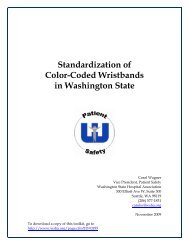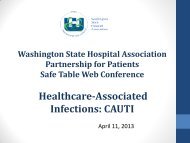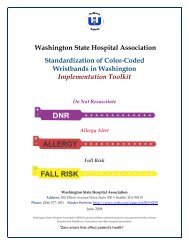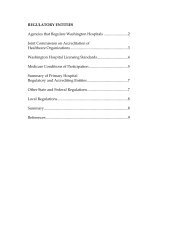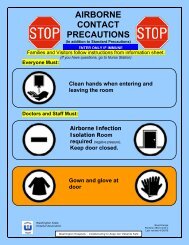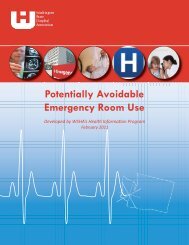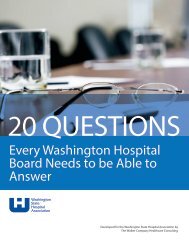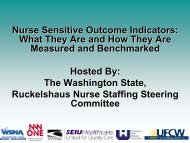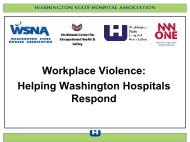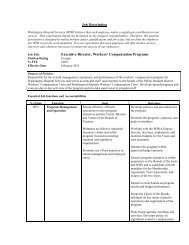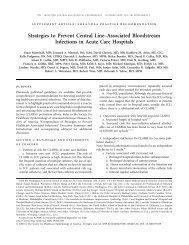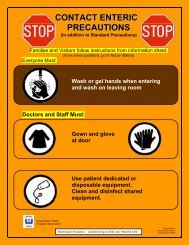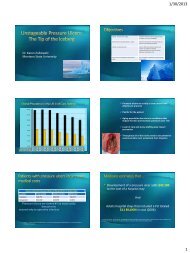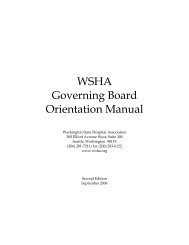Advocate Lutheran General Hospital - The Hitachi Foundation
Advocate Lutheran General Hospital - The Hitachi Foundation
Advocate Lutheran General Hospital - The Hitachi Foundation
- No tags were found...
You also want an ePaper? Increase the reach of your titles
YUMPU automatically turns print PDFs into web optimized ePapers that Google loves.
How It Began“<strong>Advocate</strong> is acontinual learningorganization.Whether it’s onthe-joblearning,whether it’s usingtuition reimbursementto help youwith your learningor education, weare constantly inwhat I would calllearning mode.That is why I sawa need to growand developfrontline workers.”PENNY PILARCZYKVICE PRESIDENT FORHUMAN RESOURCES<strong>Advocate</strong> <strong>Lutheran</strong> <strong>General</strong> <strong>Hospital</strong>has a long history of commitment tobeing an “employer of choice” andhelping employees advance theircareers. In the last decade, ALGHhas expanded its efforts to helpfrontline workers advance theircareers. Like many hospitals andhealth systems across the country,ALGH began to experience shortagesin nursing and other positionsin the 1990s. Turnover among frontlinepositions was high and languagebarriers prevented the promotion offrontline workers into vacant midlevelpositions. In response, ALGHHow It WorksEnglish as a Second LanguageImplemented in 2003, ALGH beganoffering ESL classes on-site free ofcharge to employees. Multiple classtimes were available to accommodatethe varied schedules of workers,with courses led by instructorsfrom area community colleges.Some workers who have taken ESLcourses have used the courseworkto advance their careers and education.For example, one ESL participantwho started in environmentalservices is now enrolled in a localcommunity college and working asa mid-level administrative staffbegan developing programs to provideeducational and career developmentfor frontline workers.<strong>The</strong> first program for frontline workersoffered by ALGH, implementedin the early 2000s, was an English asa Second Language (ESL) course. Itwas popular with both employeesand managers, who appreciatedtheir employees improved communicationskills. Since then, they haveexpanded the offerings for frontlineworkers at ALGH and linked them tocareer opportunities.ESL QUICK FACTSNumber of employeesparticipating 30Retention rate 99%Number promoted 1(16% wage increase)Number enrolled incommunity collegecourse work 22 Pioneer Employer <strong>Hospital</strong>s: Getting Ahead by Growing Your Own ADVOCATE LUTHERAN GENERAL HOSPITAL, CHICAGO, IL
workerspotlightHasiba Zahirovic works in thepatient transportation departmentat ALGH. Prior to coming toALGH, she had been working at agrocery store; however, she knewshe wanted to work in an environmentwhere she could moveup. When a position becameavailable in housekeeping, shegladly took the job. Hasiba hastaken both ESL and SAW courses,where she improved her math,literacy, typing, and computerskills. After completing theclasses, she moved from thehousekeeping department to hercurrent job in patient transportation.She is ultimately interestedin becoming an ultrasoundtechnician.member at ALGH. Others take ESLclasses for personal reasons; forexample, one worker enrolled so hewould be able to help his son withhis homework. Either way, administratorsfeel that offering theseclasses improves workers communicationskills and overall job satisfactionand commitment.School at Work®From 2006-2010, ALGH began toexpand the course offerings availableto frontline health care workers byimplementing the School at Work ®(SAW) program. Developed byCatalyst Learning, SAW preparesentry-level health care workers forcareer advancement and enrollmentSAW QUICK FACTSin local community colleges andtechnical schools. ALGH’s SAW programfocused on two classes:Introduction to Healthcare andBecoming a Healthcare Professional.Participants also worked with instructorsto identify and achieve personalgoals through career planning andcustomized self-assessments. Overan eight month period, the classesand career planning were offeredon-site. SAW supported studentsthrough both coursework and careerplanning with a combination of onsitecoaching and an on-line service,Career Care. Workers completeonline modules and then follow-upwith ALGH’s training specialist forone-on-one discussion and planning.Number of employees participating 41Retention rate 92%Number promoted (16% wage increase) 15Number enrolled in community college course work 8College SuccessWhile SAW was a successful program,ALGH began looking for amore cost effective and faster wayto help workers become collegeready. In 2010, ALGH partnered withOakton Community College to offera College Success course to interestedfrontline employees. <strong>The</strong>College Success course coverstopics that include what to expect incollege, how to apply, and importantskills such as how to use anonline library. <strong>The</strong> course is deliveredonsite and workers receivepaid educational release time toattend. Participants receive threecredits once they complete it. <strong>The</strong>goal of the College Success courseis to create a bridge betweenADVOCATE LUTHERAN GENERAL HOSPITAL, CHICAGO, IL Pioneer Employer <strong>Hospital</strong>s: Getting Ahead by Growing Your Own 3
frontline employees and the communitycollege. <strong>The</strong> College Successcourse intentionally creates a cohortof individuals who complete it andthen go on to enroll in the prerequisitesnecessary to enter formaldegree programs. So far, one cohortof eight students has taken thecourse. ALGH leaders intend toincrease the size of future cohorts.Incumbent Worker TrainingProgramALGH also provides a program forincumbent workers for current orpotential patient registrars. <strong>The</strong> programis a joint effort by ALGH, thelocal workforce investment board,and Oakton Community College.Oakton provides an instructor toteach the courses onsite. Thisinstructor tailors the computer,insurance, and medical terminologyclasses to meet the needs of thehospital. Once participants completethe coursework, they will beprepared to successfully perform thetasks associated with the patientregistrar position. All ten employeeswho participated in the programcompleted the training. Seventypercent of these workers are stillemployed at ALGH and 20 percenthave since received promotions(into registrar positions).Tuition AssistanceSix percent of frontline workers takeadvantage of ALGH’s tuition assistanceprograms. ALGH has two waysto access tuition assistance. <strong>The</strong> firsttuition assistance program isAccelerating Careers throughEducation (ACE). <strong>The</strong> ACE programtargets individuals interested in pursuingcareers in one of four tracks:nursing (associate’s, baccaulareate,or master’s degrees), health informationtechnology, respiratory therapy,and diagnostic imaging. <strong>The</strong>ACE program provides 100 percenttuition reimbursement for individualsenrolled in these degree programs.Workers must have been anemployee for at least one year to beeligible.Employees can also access theEducation Assistance Program,which provides monies for any educationalcoursework. Employeeswho work 40 hours or more per payperiod (pay period is two weeks) areeligible to receive reimbursementfor courses. Part-time employeesreceive $1,200 per year; full-timeemployees receive $4,000 per year.4 Pioneer Employer <strong>Hospital</strong>s: Getting Ahead by Growing Your Own ADVOCATE LUTHERAN GENERAL HOSPITAL, CHICAGO, IL
Critical Success Factors“What I havenoted is that a lotof the associatesthat had languagebarriers would shyaway from doingsomething different.<strong>The</strong>y wantedjobs that didn’ttake any skills, but[since taking anESL course] wenow have peoplethat want to moveup.”JAMES NG,HUMAN RESOURCES MANAGERALGH has been successful at developingthe basic skills of its entrylevelworkers. As lack of educationalreadiness is often a persistent barrierto career advancement for frontlinehealth care workers, support forbasic skills development is critical tofuture career advancement. ThroughALGH’s varied offerings, many participatingworkers have begun toadvance in their careers. Further,retention of these workers is veryhigh. <strong>The</strong>se successes result fromthoughtful planning and strategicimplementation of the program.Below, the critical success factorsthat facilitate the success of theirtraining programs are listed.Culture of LearningKey informants maintain that thefrontline worker development programsALGH provides align with themission and values of the organization:compassion, excellence, stewardship,and partnership. Manymanagers and administrators haverisen through the ranks so they havefirst-hand experience with what itmeans to “grow your own.” In 2010and 2011, ALGH filled open leadershippositions internally 76 percentand 64 percent of the time respectively.This impressive proportion ofinternal hires demonstrates the successof their approaches for “growingtheir own” to date and thestrength of their culture of learning.Several of the managers interviewedfor this report had completed theirdegrees while employed by ALGH.Because of their personal experiences,these managers where eagerto also help their employees takeadvantage of the career opportunitiesat ALGH. Further, the longtenure of many managers at ALGHreflects the organization’s dedicationto helping workers move up withinthe organization and pursue acareer path they enjoy.Dedicated Human ResourceTraining SpecialistHaving a single point of contact isvital to successfully managing all ofthe extensive logistics and communicationinvolved in developing andimplementing multiple training programs.Sarita Mannigel, humanresource training specialist, serves inthis role. In addition to coordinatingthe training programs describedabove, Sarita conducts new workerorientation, develops curriculum,and provides career guidance andsupport to participating workers.Workers seeking advancement canschedule an appointment with Saritato work through a series of assignmentsdesigned to identify theirneeds, interests, and skills. Based ontheir results, Sarita works with theindividual to construct a customizedplan (for example, relevant education,training, and available jobs) toADVOCATE LUTHERAN GENERAL HOSPITAL, CHICAGO, IL Pioneer Employer <strong>Hospital</strong>s: Getting Ahead by Growing Your Own 5
workerspotlightElzbieta Jedryzcka began hercareer at ALGH in the housekeepingdepartment. She hadbeen a nurse in Yugoslavia, butafter moving to the United Statesshe struggled with language barriers.At the encouragement ofher manager, she enrolled inboth School at Work ® andEnglish as a Second Languageclasses, which she really enjoyed.She stated, “At first I didn’t knowwhat to expect, but when Istarted, I found myself excited tohave books in my hand. We havea teacher who was all the timewith us, every step of the way,and it was for me somethingspecial. I love it, and I think ithelped me to find another job.”She was initially not interested inmoving up within the organization,but after completing theclasses, she began to want toexplore other career options. Shenow works in the medical suppliesdepartment and is consideringher next career move.Angela Ghazale started workingin the cafeteria at ALGH in 2003.She wanted to move up withinthe hospital, so she enrolled inEnglish as a Second Languagecourses. With her improved communicationskills, she was able tomove into the medical recordsdepartment, where she is a documentimaging processor.Angela was very grateful for theopportunity to move up withinthe hospital and pleased with herimproved communication skills.help workers pursue and achievetheir goals. Frontline workers whowant to pursue additional training ormove up within the organizationseek her out for advice andguidance.Development StrategiesTailored to the Needs ofLow-wage Adult LearnersFrontline workers face many challengesto achieving education andcareer advancement. <strong>The</strong> programsand policies described above (particularlythe ESL course, on-siteclasses, tuition assistance, and educationalrelease time) remove manyof these barriers. <strong>The</strong> understandingand sensitivity to the unique needsof low-wage adult learners furtherremoves barriers to participation.Sarita Mannigel designed the curriculumto be culturally sensitive,given the high population ofracial/ethnic minorities and immigrantsoccupying frontline positions.Sarita also explicitly addressed acommon and sometimes debilitatingbarrier for adult learners—educationanxiety. For example, sheorganized a tour of the local communitycollege to help workersbecome more comfortable and lessanxious about navigating the educationalsystem. Participating workerscommented on how supportiveand helpful Sarita is, and referredco-workers to her who could benefitfrom similar assistance. Attention tothe unique needs of adult learnersrepresents further support for frontlineworkers attempting to advancetheir careers.Supportive Leadership<strong>The</strong> leadership at ALGH has a historyof supporting frontline workersand promoting within the organization.For example, the Vice Presidentfor Human Resources, PennyPilarczyk, talked about her personalcareer path as part of her motivationfor working to develop moreformal career resources for frontlineworkers. When she started workingfor the organization as a manager,she did not have her bachelor’sdegree. With the support of ALGH,she later obtained it, and recentlycompleted her master’s degree aswell. <strong>The</strong> leadership at ALGH clearlyfostered a culture of frontline workerdevelopment and promotion withinthe organization; the programs thatthey have developed over the lastdecade help formalize the processof frontline worker advancement.Supervisor/Manager SupportAdministrators noted that gainingsupervisor support has been a challengeat times. <strong>The</strong> courses are usuallydesigned to be attended at theend of a shift, so participants completehalf of the course during worktime and half on their own time. <strong>The</strong>organization has worked hard todemonstrate to managers andsupervisors that ultimately theirdepartments benefit from these6 Pioneer Employer <strong>Hospital</strong>s: Getting Ahead by Growing Your Own ADVOCATE LUTHERAN GENERAL HOSPITAL, CHICAGO, IL
investments. Some strategies keyinformants identified to engagefrontline supervisors include: involvingfrontline worker managers aspart of the education process, communicatingregularly via progressreports, identifying the potentialbenefits of the program for managers,and sharing attribution forprogram successes with managersand supervisors as appropriate.Celebrating Accomplishments<strong>The</strong> human resource training specialistat ALGH thinks it is important tocelebrate the accomplishments offrontline workers that pursue additionaltraining. For example, theorganization throws a party at thecompletion of every ESL or SAWclass, administrators attend, andmany workers invite their familymembers. Demonstrating thatthe organization supports andrecognizes the workers’ accomplishmentsencourages them to undertakeadditional training.Strong PartnershipsSeveral of the programs ALGH providesare implemented with the helpof other organizations. For example,ALGH works with Catalyst Learningfor SAW and Career Care. <strong>The</strong>bridge program and the registrar/intake trainings are provided byOakton Community College. HarperCollege serves as a partner to ALGHfor the onsite ESL program. Withoutthe flexibility and buy-in from theseorganizations, it would be difficultfor the hospital to achieve the scopeand depth of success it has achieved.Further, partnering with local organizationspools resources to increasereturns on investment, with reducedburden on any one partner.Return on InvestmentALGH invests $1,000,000 of the hospital’sbudget into the tuition assistanceprograms, $30,000 per yearfor the ESL and SAW programs, andpays .65 FTE salary for the trainingspecialist. External grant funds helpsupport the College Success andincumbent worker training programs.All hospital staff interviewedagreed that the investment ismoney well spent and urge leadersto continue funding each budgetyear. <strong>The</strong> outcomes achieved for theworkers and the hospital providethe justification and rational to continueproviding formal (for example,financial, human resource policies)and informal (for example, schedule)accommodations for the program.Below are the most salient returnson the investment for the hospital.ADVOCATE LUTHERAN GENERAL HOSPITAL, CHICAGO, IL Pioneer Employer <strong>Hospital</strong>s: Getting Ahead by Growing Your Own 7
HOSPITAL’S RETURN ON INVESTMENTRetentionLower Vacancy RatesHigh WorkerSatisfactionImprovementsto Care DeliveryLeadershipProviding a career ladder for workers helps ALGH to retain valued employees. Retentionamongst program participants is exceptional (92-99 percent). ALGH has the lowestturnover within the <strong>Advocate</strong> Health Care System (6.16 percent overall). Also,many of the managers and workers interviewed as part of this case study had beenemployed at ALGH for ten or more years. Key informants believe the career developmentprograms the hospital offers is a key contributor to such strong retention.ALGH no longer has problem with vacancies or shortages in frontline worker positions.Current vacancy and turnover rates hover around two and seven percent respectively.While this is also a result of current economic conditions, the frontline worker programshave helped to alleviate vacancies and turnover in positions that had been a challengefor ALGH.ALGH ranks in the 90th percentile for employee satisfaction (as rated by Reuter’s).ALGH employee comments echo this statistic. Managers and frontline workersconsistently reported that they were very happy at ALGH, and their long tenureswith the organization reflected their high level of commitment to their employer.<strong>The</strong>y expressed appreciation for the support ALGH had provided in helping themadvance their careers and a high level of satisfaction with their employer’s policiesand practices.Supervisors, managers, and administrators all noted that workers who participated inonline courses have greater confidence and improved skills in their positions. Supervisorsand managers noted that workers who took ESL classes interacted with patients,co-workers, and managers much more. As stated by manager David Uchman, “To me,the best outcome of any of these programs really is confidence and improvement intheir communication.”Administrators noted that they consistently see graduates move into a higher level ofprofessional responsibility in their work environment. <strong>The</strong>y become either formal orinformal practice leaders in their environments and contribute at a higher levelthrough a better understanding and appreciation of what it means to be a leader.8 Pioneer Employer <strong>Hospital</strong>s: Getting Ahead by Growing Your Own ADVOCATE LUTHERAN GENERAL HOSPITAL, CHICAGO, IL
Next StepsALGH remains committed to developingthe careers of frontline workers.<strong>The</strong> hospital plans to further itsexisting efforts at career developmentand skills acquisition by partneringwith National Louis University(NLU) to facilitate credit-for-priorlearning for frontline workers. NLUoffers bachelor’s, master’s, and doctoraldegrees in 60 disciplines in theareas of education, human services,business, and the arts and sciences.NLU serves 11,000 students acrossfive campuses in the Chicago area,three others nationwide, and operatesa business school in Poland.NLU is an accredited private universitythat specializes in innovativestudent-centered education fordiverse working adults. <strong>The</strong> universityhas portfolio and testing mechanismsto award college credit forskills and knowledge learnedthrough work experience. ALGHleaders view this potential partnershipas beneficial to helping workersaccelerate completion of degreeprograms and helping the hospitalspend less money on tuition assistance.NLU is also an ideal partnergiven their extensive experience withadult learners and their hybrid modelsof course delivery.ALGH’s support for frontline workerdevelopment is on-going. <strong>The</strong> ESLand other classes have providedtangible benefits for workers, managers,and ultimately patients. Asstated by David Uchman, Director ofPatient Support Services, “Ultimatelyour goal is to create this serviceexcellence, and you can focus onphysicians, you can focus on theclinical piece of it. But there’s still awhole kind of underbelly of theorganization that has an integralrole in the patient’s perception ofwhat they think the facility is allabout. A lot of times it’s the firstimpression or the last impression,and my associates many times areinvolved in that.” ALGH deeply recognizesthat quality improvementrequires investment in workers at alllevels of the organization.ADVOCATE LUTHERAN GENERAL HOSPITAL, CHICAGO, IL Pioneer Employer <strong>Hospital</strong>s: Getting Ahead by Growing Your Own 9



